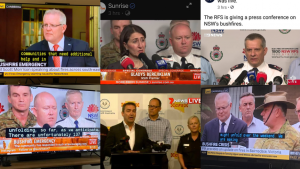International Sign Languages Day is celebrated each year on 23 September. In 2020 the World Federation of the Deaf is stepping up its lobby efforts for the celebration, challenging global leaders to promote the use of sign languages.
Australia’s top political leaders are already onboard, promoting the use of Auslan sign language in their daily coronavirus daily updates for Australians. But there is more work to be done in the country to promote the use of Auslan Down Under.
Auslan is the portmanteau of Australian sign language and the main sign language of Australians who are deaf. It has been recognised as a as a community language preferred by the deaf community, as noted decades ago in 1987 and 1991 Australian policy statements.
While Auslan is used to translate spoken English, it is not based on English as DeafVictoria explains:
[Auslan] has a different set of rules for grammar and syntax. Its vocabulary is also different to English. Auslan is a natural language which was developed organically over time. It is also a visual–spatial language where hands, eye gaze, facial expressions and arm, head and body postures are used to convey messages. Precise handshapes, facial expressions and body movements are needed to convey both concrete and abstract information.
Western Australian Auslan interpreter Fiona Perry explains to WAMN news she is honoured to interpret for WA Premier Mark McGowan’s coronavirus briefings press conference and outlines her approach to ensuring the audience receive the correct information:
Through our body language and facial expressions that will link into the person who is speaking, their tone of voice, then we portray that. So we’re mirroring.
Fiona has become a social media sensation.
Sign language is having a moment here in Western Australia. I knew it when I saw a school mum I know comment on the Facebook live of WA Premier Mark McGowan’s daily press conference ‘these two are my new favourite tv show.’
Fiona Perry was teaching McGowan how to sign Easter bunny in Auslan.
https://www.youtube.com/watch?v=KU1Go0iQkQw
On another occasion, Auslan interpreter Dianne Prior included the heckles from passers-by, including expletives and a long wooooooo.
While these were moments of fun among the seriousness and uncertainty of COVID-19, Auslan is a vital form of communications for many Australians during times of emergency. Yet they are often denied access to it as the Australian Communications Consumer Action Network explains:
During broadcasts of information about the SA Bushfires on 26 November 2015, ABC’s morning news, Channel Nine’s Today Show and Channel Seven’s Sunrise cropped the Auslan interpreters out of the screen, effectively cutting off access to this important information for Auslan users.
According to The Australian Communications and Media Authority, broadcasters ‘do not have to include an Auslan sign language interpreter’ during emergency broadcasts according to current legislation, even if they are present at the original press conference.
In fact, the best practice protocol for both FreeTV and the Australian Subscription Television and Radio Association is:
Where an Auslan interpreter is present at a news conference or official briefing about an emergency, licensees will include the Auslan interpreter in the frame of the broadcast where it is practicable to do so.
But when it’s a matter of life and death, how is it practical not to include the Auslan interpreter? And who decides?
The Digital Inclusion and Media Access program at the Curtin University Centre for Culture and Technology (CCAT) recently made a submission on this topic to the Royal Commission into Violence Abuse and Neglect of People with Disability Emergency Planning and Responses Issues Paper.
Our CCAT submission focused on the current broadcasting legislative environment and highlighted the importance of including Auslan alongside captions and audio descriptions in emergency broadcasts on Australian television.
We compared the prioritisation of including Auslan interpreters during the COVID crisis with other public emergences such as the recent 2019 Australian bushfires and bushfires in the past:
Throughout the COVID crisis the importance of 1.5-metre social distancing has been emphasized, and in many circumstances, this requires the Auslan interpreter to be standing apart from the speaker they are interpreting for. This distancing has made inclusion within the frame more difficult. Fortunately, most broadcasters have included the interpreter and even featured news coverage on the individual interpreters and their role in assisting the distribution of emergency information. However, this was not the case as recently as December 2019, before the COVID crisis and during the NSW bushfires. The ABC demonstrated how easy it is to refrain from including the interpreter when, during the recent bushfire crisis in NSW, the Auslan interpreter was on many occasions not included in vital broadcasts across the televisual landscape. This is during a time when 1.5-metre distancing was not needed. Interpreters were deliberately and systematically cut out of shot.
Image showing Auslan interpreters cut out of shot at media briefings during the 2019 bushfire emergency. Sourced from Harriet Tatham, “Auslan interpreters save lives in bushfires, but only if they make the TV screen,” ABC News, posted Friday 10 January 2020, https://www.abc.net.au/news/2020-01-10/auslan-interpreter-sean-sweeney-australian-bushfires/11848818
The role of global leaders in promoting the use of sign language interpreters is therefore vital in ensuring signing reaches the audience that needs it. McGowan’s interactions with his Auslan interpreters has endeared both Auslan and McGowan to the WA public. The constant presence of these interpreters is critical in ensuring the 10,000 Auslan speakers in Australia receive emergency communications.
